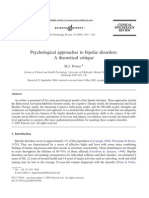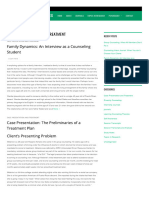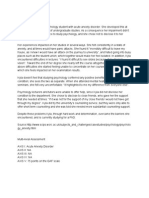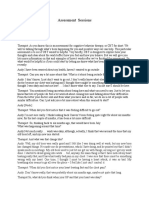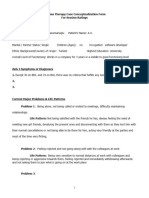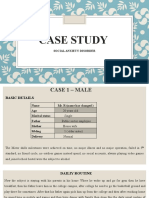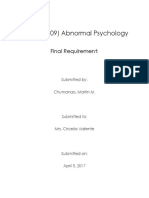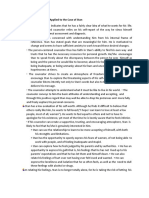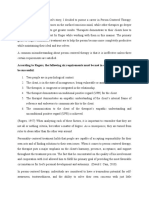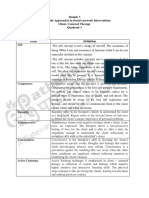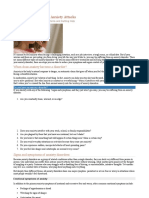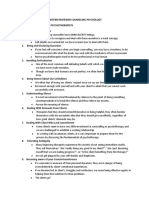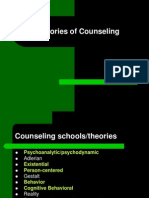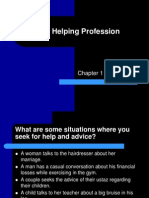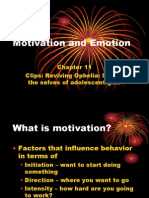Assignment Case Study Karen PSY 355
Assignment Case Study Karen PSY 355
Uploaded by
osrah_gCopyright:
Available Formats
Assignment Case Study Karen PSY 355
Assignment Case Study Karen PSY 355
Uploaded by
osrah_gOriginal Description:
Copyright
Available Formats
Share this document
Did you find this document useful?
Is this content inappropriate?
Copyright:
Available Formats
Assignment Case Study Karen PSY 355
Assignment Case Study Karen PSY 355
Uploaded by
osrah_gCopyright:
Available Formats
ASSIGNMENT CASE STUDY - KAREN
AGE 39
SEX Female
MARITAL STATUS Married SOCIOECONOMIC STATUS Middle Class
NAME KAREN LEE
APPEARANCE Dresses meticulously, is overweight, fidgets constantly with her clothes, avoids eye contact, speaks rapidly LIVING SITUATION Recently graduated from college as an elementary-special education major, lives with husband (Tim, 45) and her children (Tom -19, Jane 17, and Tan 16). PRESENTING PROBLEM Client reports general dissatisfaction. She says her life is rather uneventful and predictable, and she feels some panic over reaching the age of 39, wondering where the years have gone. For two years she has been troubled with a range of psychosomatic complaints, including sleep disturbances, anxiety, dizziness, heart palpitations, and headaches. At times she has to push herself to leave the house. Client complains that she cries easily over trivial matters, often feels depressed, and has a weight problem. HISTORY OF PRESENTING PROBLEM Client made her major career as a housewife and mother until her children became adolescents. She then entered college part time and obtained a bachelors degree. She has recently begun work toward a credential in elementary education. Through her contacts with others at the university she became aware of how she has limited herself, how she has fostered her familys dependence on her, and how frightened she is of branching out from her roles as mother and wife. Karen completed a course in introduction to counselling that encouraged her to look at the direction of her own life. As a part of the course she participated in self-awareness groups, had a few individual counselling sessions, and wrote several papers dealing with the turning points in her own life. One of the requirements was to write an extensive autobiography that was based on an application of the principles of the counselling course to her own personal development. This course and her experiences with fellow students in it acted as a catalyst in getting her to take an honest look at her life. Karen is not clear at this point who she is, apart from being a mother, wife, and student. She realizes that she does not have a good sense of what she wants for herself and that she typically lived up to what others in her life wanted for her. She has decided to seek
COUNSELLING : CASE STUDY - KAREN
ASSIGNMENT CASE STUDY - KAREN
individual therapy for the following reasons: A physician whom she consulted could find no organic or medical basis for her physical symptoms and recommended personal therapy. In her words, her major symptoms are there: I sometimes feel very panicky, especially at night when Im trying to sleep. Sometimes Ill wake up and find it difficult to breathe, my heart will be pounding, and Ill break out in a cold sweat. I toss and turn trying to relax, and instead I feel tense and worry a lot about many little things. Its hard for me to turn off these thoughts. Then during the day Im so tired I can hardly function, and I find that lately I cry very easily even if minor things go wrong. She is aware that she has lived a very structured and disciplined life, that she has functioned largely by taking care of the home and the needs of her four children and her husband, and that to some degree she is no longer content with this. Yet she reports that she doesnt know what more than this is. Although she would like to get more involved professionally, the thought of doing it does frighten her. She worries about her right to think and act selfishly, she fears not succeeding in the professional world, and she most of all worries about how becoming more professionally involved might threaten her family. Her children range in age from 16 to 19, and all of them are now finding more of their satisfactions outside of the family and the home and are spending increasing time with their friends. Karen sees these changes and is concerned about losing them. She is having particular problems with her daughter Jane, and she is at a loss how to deal with Janes rebellion. In general, Karen feels very much unappreciated by her children. In thinking about her future, she is not really sure who or what she wants to become. She would like to develop a sense of herself apart from the expectations of others. She finds herself wondering what she should want and what she should be doing. Karen does not find her relationship with her husband, Tim, at all satisfactory. He appears to be resisting her attempts to make changes and prefers that she remain as she was. But she is anxious over the prospects of challenging this relationship, fearing that if she does, she might end up alone. Lately, Karen is experiencing more concern over aging and losing her looks. All of these factors combined have provided the motivation for her to take the necessary steps to initiate individual therapy. Perhaps the greatest catalyst that triggered her to come for therapy is the increase of her physical symptoms and her anxiety.
COUNSELLING : CASE STUDY - KAREN
ASSIGNMENT CASE STUDY - KAREN
PSYCHOSOCIAL HISTORY Client was the older of four children. Her father is a fundamentalist minister, and her mother, a housewife. She describes her father as distant, authoritarian, and rigid; her relationship with him was one of unquestioning, fearful adherence to his rules and standards. She remembers her mother as being critical, and she thought that she could never do enough to please her. At other times her mother was supportive. The family demonstrated little affection in many ways Karen took on the role of caring for her younger brother and sisters, largely in the hope of winning the approval of the parents. When she attempted to have any kind of fun, she encountered her fathers disapproval and outright scorn. To a large extent this pattern of taking care of others has extended throughout her life. One critical incident took place when Karen was 6 years old. She reported: My father caught me playing doctor with an 8-year-old boy. He lectured me and refused to speak to me for weeks. I felt extremely guilty and ashamed. It appears that Karen carried feelings of guilt into her adolescence and that she repressed her own emerging sexuality. In her social relationships Karen had difficulty in making and keeping friends. She felt socially isolated from her peers because they viewed her as weird. Although she wanted the approval of others, she was not willing to compromise her morals for fear of consequences. She was not allowed to date until she completed high school; at the age of 19 she married the first person she had dated. She used her mother as a role model by becoming a homemaker. Assume that Karen comes to you for personal counseling and that all you know about her is as above. Choose 1 theory on how you might proceed with Karen. You may use the following questions as a guideline. 1. When you consider the philosophical assumptions underlying the approach you chose in the question above, what are its implications for therapeutic practice? 2. What are your basic assumptions about human nature? 3. What do you consider to be the most important therapeutic goals? 4. How would you describe your function and role as a helper or a counsellor? 5. What would you expect of your client? How do you view the relationship between you and your client?
COUNSELLING : CASE STUDY - KAREN
You might also like
- Digital Discipleship Evangelism (Jamie Domm (Domm, Jamie) ) (Z-Library)Document299 pagesDigital Discipleship Evangelism (Jamie Domm (Domm, Jamie) ) (Z-Library)Ngabonziza Olivier100% (1)
- Assignment 4 Sampledetailed Spring23Document9 pagesAssignment 4 Sampledetailed Spring23sagems14No ratings yet
- Working Together in Clinical SupervisionDocument28 pagesWorking Together in Clinical SupervisionCharleneKronstedt100% (1)
- Clinical Psychology Case Study AllisonDocument9 pagesClinical Psychology Case Study AllisonIoana VoinaNo ratings yet
- Case Analysis Case Study HelgaDocument10 pagesCase Analysis Case Study Helgaapi-487413988No ratings yet
- A Filled-In Example: Schema Therapy Case Conceptualization FormDocument10 pagesA Filled-In Example: Schema Therapy Case Conceptualization FormKarinaNo ratings yet
- PTSD EssayDocument2 pagesPTSD Essayapi-338213804No ratings yet
- Beck Cognitive Insight Scale (BCIS)Document3 pagesBeck Cognitive Insight Scale (BCIS)kinz7879No ratings yet
- Psychological Approaches To Bipolar Disorders: A Theoretical CritiqueDocument22 pagesPsychological Approaches To Bipolar Disorders: A Theoretical CritiqueGary CadfaelNo ratings yet
- Wc5945f Service Manual XeroxDocument1,446 pagesWc5945f Service Manual XeroxBruno Paquola90% (20)
- 1 Case Formulation - BronDocument4 pages1 Case Formulation - BronallysoncaiNo ratings yet
- Case Presentation and Treatment ArchivesDocument3 pagesCase Presentation and Treatment ArchivesДоника100% (1)
- Case Vignette 1Document3 pagesCase Vignette 1api-312964081No ratings yet
- Final ReportDocument12 pagesFinal ReportRACHANA MURALIDHAR 1833279No ratings yet
- Sample Case Study For DMS-IV-TRDocument6 pagesSample Case Study For DMS-IV-TRohphooeyNo ratings yet
- Establishing The Counsellor-Client Relationship in The First Counselling Session SessionDocument8 pagesEstablishing The Counsellor-Client Relationship in The First Counselling Session Sessionsagar bagulNo ratings yet
- CBT Interview & Formulation AndyDocument2 pagesCBT Interview & Formulation AndyuusssffNo ratings yet
- Case Conceptualization Form - OrnekDocument6 pagesCase Conceptualization Form - Ornekpsk.eminemerterNo ratings yet
- Critique On Psychoanalytic Theory and Adlerian Therapy RD 011709Document4 pagesCritique On Psychoanalytic Theory and Adlerian Therapy RD 011709Lavelle100% (3)
- Psych Case StudyDocument14 pagesPsych Case StudySmridhi Seth100% (1)
- Mental Health Case StudyDocument10 pagesMental Health Case Studyapi-401649616No ratings yet
- Case ConferenceDocument32 pagesCase ConferenceRuchi TrivediNo ratings yet
- Case StudyDocument10 pagesCase StudyARABELLA FUNDARNo ratings yet
- Research Paper: Posttraumatic Stress Disorder Abnormal Psychology Liberty University March 2, 2014Document11 pagesResearch Paper: Posttraumatic Stress Disorder Abnormal Psychology Liberty University March 2, 2014mzsjacksonNo ratings yet
- Class12 Psychology Unit05 NCERT TextBook EnglishEditionDocument17 pagesClass12 Psychology Unit05 NCERT TextBook EnglishEditionDhave ManzanoNo ratings yet
- The Historical Evolution of PTSD Diagnostic Criteria: From Freud To DSM-IVDocument18 pagesThe Historical Evolution of PTSD Diagnostic Criteria: From Freud To DSM-IVZach FoutchNo ratings yet
- Case Study: Social Anxiety DisorderDocument13 pagesCase Study: Social Anxiety DisorderRohini RaghuNo ratings yet
- Asma - Report For QOLIDocument5 pagesAsma - Report For QOLIpragati100% (1)
- Generalized Anxiety Disorder: Timothy A. Brown Tracy A. O'Leary David H. BarlowDocument55 pagesGeneralized Anxiety Disorder: Timothy A. Brown Tracy A. O'Leary David H. BarlowCamila JoaoNo ratings yet
- Case Study Development and Theoretical ExplanationDocument7 pagesCase Study Development and Theoretical ExplanationAssignmentLab.com100% (1)
- Wells Brief Cognitive Therapy For Social Phobia - A Case SeriesDocument8 pagesWells Brief Cognitive Therapy For Social Phobia - A Case SeriesjuaromerNo ratings yet
- Clients Case StudyDocument20 pagesClients Case StudyShanen Baguilat DawongNo ratings yet
- The Empty ChairDocument1 pageThe Empty Chairapi-244827434No ratings yet
- Social Anxiety DisorderDocument6 pagesSocial Anxiety Disordernicole.recedeNo ratings yet
- Person-Centered Counseling Applied To Stan's CaseDocument2 pagesPerson-Centered Counseling Applied To Stan's CaseREMY JOY CABANNo ratings yet
- Assessment 2 Case StudyDocument6 pagesAssessment 2 Case StudyMudassar Gul Bin AshrafNo ratings yet
- Linking Assessment and TreatmentDocument37 pagesLinking Assessment and Treatmentaimee2oo8No ratings yet
- Treating The Trauma of Rape CBT For PTSDDocument6 pagesTreating The Trauma of Rape CBT For PTSDJulianaNo ratings yet
- Adlerian Case FormulationDocument24 pagesAdlerian Case FormulationJellie Mae Lazaro100% (1)
- Acceptance and Commitment Therapy For ChildrenDocument53 pagesAcceptance and Commitment Therapy For ChildrenClaudiaNo ratings yet
- Posttraumatic Cognitions Inventory (PTCI)Document2 pagesPosttraumatic Cognitions Inventory (PTCI)Jessica KruminsNo ratings yet
- What S in A Case Formulation PDFDocument10 pagesWhat S in A Case Formulation PDFNicole Flores MuñozNo ratings yet
- Module 7 Client Centred Therapy RefDocument9 pagesModule 7 Client Centred Therapy RefHarish Kumar100% (1)
- Summary of The Different Therapies Therapies What Is The Nature of Man/causes of Behavior Key Concepts Therapy Techniques/Process Client ExperiencesDocument17 pagesSummary of The Different Therapies Therapies What Is The Nature of Man/causes of Behavior Key Concepts Therapy Techniques/Process Client ExperiencesMel SJB100% (1)
- The Test Anxiety Inventory For Children and Adolescents (TAICA)Document16 pagesThe Test Anxiety Inventory For Children and Adolescents (TAICA)WinnieNo ratings yet
- Adlerian PsychotherapyDocument32 pagesAdlerian Psychotherapyerkankalem3783No ratings yet
- Anxiety Disorders and Anxiety AttacksDocument11 pagesAnxiety Disorders and Anxiety AttacksBrgy BalolingNo ratings yet
- Case Formulation in PsychotherapyDocument5 pagesCase Formulation in PsychotherapySimona MoscuNo ratings yet
- Midterm Reviewer Counseling PsychologyDocument5 pagesMidterm Reviewer Counseling PsychologyRivera EmieNo ratings yet
- Case Study of Counselling ProblemsDocument9 pagesCase Study of Counselling ProblemsBea Rosales100% (1)
- Case Study Jared Tacey Youngstown State UniversityDocument13 pagesCase Study Jared Tacey Youngstown State Universityapi-402076669100% (1)
- Format of Writing A Psychological ReportDocument2 pagesFormat of Writing A Psychological ReportLester SagunNo ratings yet
- Annettes Case Study AdditionDocument15 pagesAnnettes Case Study AdditionAmtul AzizNo ratings yet
- Family Therapy Two Case StudiesDocument17 pagesFamily Therapy Two Case StudiesjadnberbariNo ratings yet
- Guilford Press FlyerDocument2 pagesGuilford Press Flyerskkundor0% (1)
- Case ConceptualizationDocument6 pagesCase ConceptualizationAnitha PeterNo ratings yet
- Neurotic NeedsDocument1 pageNeurotic NeedsShan TeeNo ratings yet
- Cluster BDocument3 pagesCluster BMegNo ratings yet
- Welsted Assessment ReportDocument11 pagesWelsted Assessment Reportapi-531589523No ratings yet
- Major Depression Case 2Document14 pagesMajor Depression Case 2Mahnoor Malik100% (1)
- Chia LeeDocument5 pagesChia Leeosrah_gNo ratings yet
- Case AnalysisDocument4 pagesCase Analysisosrah_gNo ratings yet
- Case AnalysisDocument4 pagesCase Analysisosrah_gNo ratings yet
- Moral StudiesDocument18 pagesMoral Studiesosrah_gNo ratings yet
- Assessment Psy 355Document9 pagesAssessment Psy 355osrah_gNo ratings yet
- Theories of CounselingDocument62 pagesTheories of Counselingosrah_g100% (5)
- Chapter 1 The Helping Profession-1Document24 pagesChapter 1 The Helping Profession-1osrah_gNo ratings yet
- An Introduction To Interviewing: Chapter SummaryDocument28 pagesAn Introduction To Interviewing: Chapter Summaryosrah_gNo ratings yet
- Chapter 16 Psychtx BasicDocument28 pagesChapter 16 Psychtx Basicosrah_gNo ratings yet
- Chapter 11 Motivation BasicDocument31 pagesChapter 11 Motivation Basicosrah_gNo ratings yet
- An Interpersonal Communication ProcessDocument46 pagesAn Interpersonal Communication Processosrah_g100% (1)
- Top 2 Earth StructureDocument22 pagesTop 2 Earth Structureosrah_gNo ratings yet
- CHAPTER 14 (Part 1) Acid Precipitation: CHEM115 Environmental Chemistry Background SourceDocument20 pagesCHAPTER 14 (Part 1) Acid Precipitation: CHEM115 Environmental Chemistry Background Sourceosrah_gNo ratings yet
- Biogas FlaresDocument12 pagesBiogas Flaresdit25195683100% (1)
- Rgu (LLM L&icl) TanveerDocument4 pagesRgu (LLM L&icl) TanveerMirza MahsamNo ratings yet
- Your First 100 Tagalog Sentences 2nd Edition.1 PDFDocument39 pagesYour First 100 Tagalog Sentences 2nd Edition.1 PDFGabrielle Rivera100% (1)
- Listening: Off Campus Excursion NotesDocument13 pagesListening: Off Campus Excursion NotesDương Nguyễn AnNo ratings yet
- Grade Control Drilling With RC and QAQC of SampleDocument43 pagesGrade Control Drilling With RC and QAQC of SampleJulian I Swandi100% (4)
- Efficient Replication of Factor ReturnsDocument19 pagesEfficient Replication of Factor Returnstachyon007_mechNo ratings yet
- Life Cycle Cost Estimate For 2 ENERGY STAR Qualified Room Air Conditioner(s)Document11 pagesLife Cycle Cost Estimate For 2 ENERGY STAR Qualified Room Air Conditioner(s)selisenNo ratings yet
- MN008348A01-AB Multilingual MOTOTRBO DM1600 DM1400 Mobile Radio User GuideDocument531 pagesMN008348A01-AB Multilingual MOTOTRBO DM1600 DM1400 Mobile Radio User GuideQuentin RogissartNo ratings yet
- Rope CourseDocument40 pagesRope Courseoliver garcianoNo ratings yet
- For ReviewDocument4 pagesFor Reviewlayson christianNo ratings yet
- DJI Assistant 2 Release Notes PDFDocument17 pagesDJI Assistant 2 Release Notes PDFmgkyawthuhlaingNo ratings yet
- BSPDocument3 pagesBSPJohn Clifford LeeNo ratings yet
- KMS FB and V4L2 How To Select A Graphics and Video APIDocument47 pagesKMS FB and V4L2 How To Select A Graphics and Video APITung Dang Son0% (1)
- SG3KTL-D Certificado IEEE1547-2003 UL1741Document2 pagesSG3KTL-D Certificado IEEE1547-2003 UL1741Jose GraciaNo ratings yet
- Hci QBDocument52 pagesHci QBJayaprasannaNo ratings yet
- Unit-Iii: Figure 4.1: Intermediate Code GeneratorDocument33 pagesUnit-Iii: Figure 4.1: Intermediate Code GeneratorSivaiah PonugotiNo ratings yet
- Sultan Kudarat State University College of Graduate StudiesDocument8 pagesSultan Kudarat State University College of Graduate StudiesJebjeb C. BrañaNo ratings yet
- Fabrication and Installation of Offshore HVAC SystemsDocument5 pagesFabrication and Installation of Offshore HVAC SystemsAli Aimran100% (1)
- Santa Barbara County Calle Real Campus Master Plan PresentationDocument11 pagesSanta Barbara County Calle Real Campus Master Plan Presentationgiana_magnoliNo ratings yet
- PDF File: Active Reading Skills Third Edition Short ReviewsDocument2 pagesPDF File: Active Reading Skills Third Edition Short Reviewsemran tabibianNo ratings yet
- How To Install OS X Mountain Lion in Virtualbox With HackbootDocument16 pagesHow To Install OS X Mountain Lion in Virtualbox With Hackbootyuganshu_soniNo ratings yet
- Bo de Thi Giua Hoc Ky 2 Mon Tieng Anh Lop 8 Co Dap AnDocument21 pagesBo de Thi Giua Hoc Ky 2 Mon Tieng Anh Lop 8 Co Dap AnĐức Anh TrịnhNo ratings yet
- Setting A Godet Into Slit Fabric - La Cotte SimpleDocument12 pagesSetting A Godet Into Slit Fabric - La Cotte SimpleCibele AndradeNo ratings yet
- SDL MuscularDocument6 pagesSDL MuscularMonique Eloise GualizaNo ratings yet
- Chapter-1 The Lost ChildDocument5 pagesChapter-1 The Lost ChildVinodhini GnanaprakasamNo ratings yet
- Panasonic Toyota Cq-js6880g SMDocument28 pagesPanasonic Toyota Cq-js6880g SMdumberNo ratings yet
- DC Power SupplyDocument4 pagesDC Power SupplyAnti CrazyNo ratings yet
- Assignment 5 - PythonDocument2 pagesAssignment 5 - Pythontayowilliams23No ratings yet








